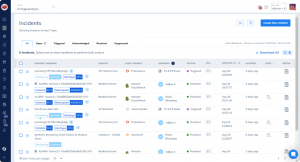Rapleaf’s Poor Consumer Privacy Points Decoded: the Latest Domino to Fall
![]() If last week’s discoveries of Facebook’s data leaking wasn’t a lesson in privacy protection, perhaps today’s news of Rapleaf will pique your interest. The Wall Street Journal has continued with its exposé on questionable corporate practices, unearthing the data Rapleaf has on millions of consumers.
If last week’s discoveries of Facebook’s data leaking wasn’t a lesson in privacy protection, perhaps today’s news of Rapleaf will pique your interest. The Wall Street Journal has continued with its exposé on questionable corporate practices, unearthing the data Rapleaf has on millions of consumers.
Like many other data-tracking and research companies, Rapleaf keeps cookie profiles on web users, selling data to advertising companies. The problem with Rapleaf, however, is its retention of actual names. The company insists that the data is not sold, or directly affiliated with other information on that consumer. But with links to email addresses and social networking profiles, it’s pretty easy to connect the dots.
Once connected, an individual profile can reveal information like book and religious preferences, the types of ads they typically click on, if they’re interests revolve around tobacco, and other patterned web behavior. It’s creepy, and very unnerving–enough so that one of Rapleaf’s advisory board members, Jim Dempsey, has decided to step down.
So far, the WSJ probe has prompted a few things to happen, including some announced changes at Rapleaf regarding the way this company does business. According to the publication, “RapLeaf says its transmission of Facebook and MySpace IDs was inadvertent and the practice was ended after the Journal brought it to the company’s attention. The company says people can permanently opt out of its services at RapLeaf.com.”
![]() And that opt-out is something a number of consumers are going to be interested in, as this story trickles down the news pipe. Blogs have already posted information on how to do so, anticipating reader responses and inquisitions.
And that opt-out is something a number of consumers are going to be interested in, as this story trickles down the news pipe. Blogs have already posted information on how to do so, anticipating reader responses and inquisitions.
But the realization that web behavior isn’t nearly as private as many expect or hope is part of the growth process as the Internet continues on its developmental path. Figuring out what corporate boundaries are is a necessary aspect of maintaining comfort between the two groups. Doing so in as painless a process as possible is just a matter of corporate responsibility.
In just one week, the WSJ story on Facebook data leaks led to a Congressional investigation for the social network, consumer backlash and an announcement by Facebook that it would be modifying its privacy encryption process to deter third party applications from accessing and releasing certain user information.
One popular Facebook app maker, Zynga, is also being sued by users for privacy infringement. It’s all a matter of how consumers are able to control their data and the ways in which it’s being used (not to mention, who’s using it).
Google’s well aware of current privacy concerns, though some seem to think its CEO has blurred the line between useful services and stalking. It’s Street Views maps, still under investigation, are gaining waves of negative attention as the public realizes just how much information Google has on an individual. In true Google form, Eric Schmidt is pushing the company’s actions as improvements towards the future, not an overstepping of boundaries.
No matter what side of the fence you land, the core of the privacy argument remains around consumer interests. And they can be a tough crowd to please.
A message from John Furrier, co-founder of SiliconANGLE:
Your vote of support is important to us and it helps us keep the content FREE.
One click below supports our mission to provide free, deep, and relevant content.
Join our community on YouTube
Join the community that includes more than 15,000 #CubeAlumni experts, including Amazon.com CEO Andy Jassy, Dell Technologies founder and CEO Michael Dell, Intel CEO Pat Gelsinger, and many more luminaries and experts.
THANK YOU















